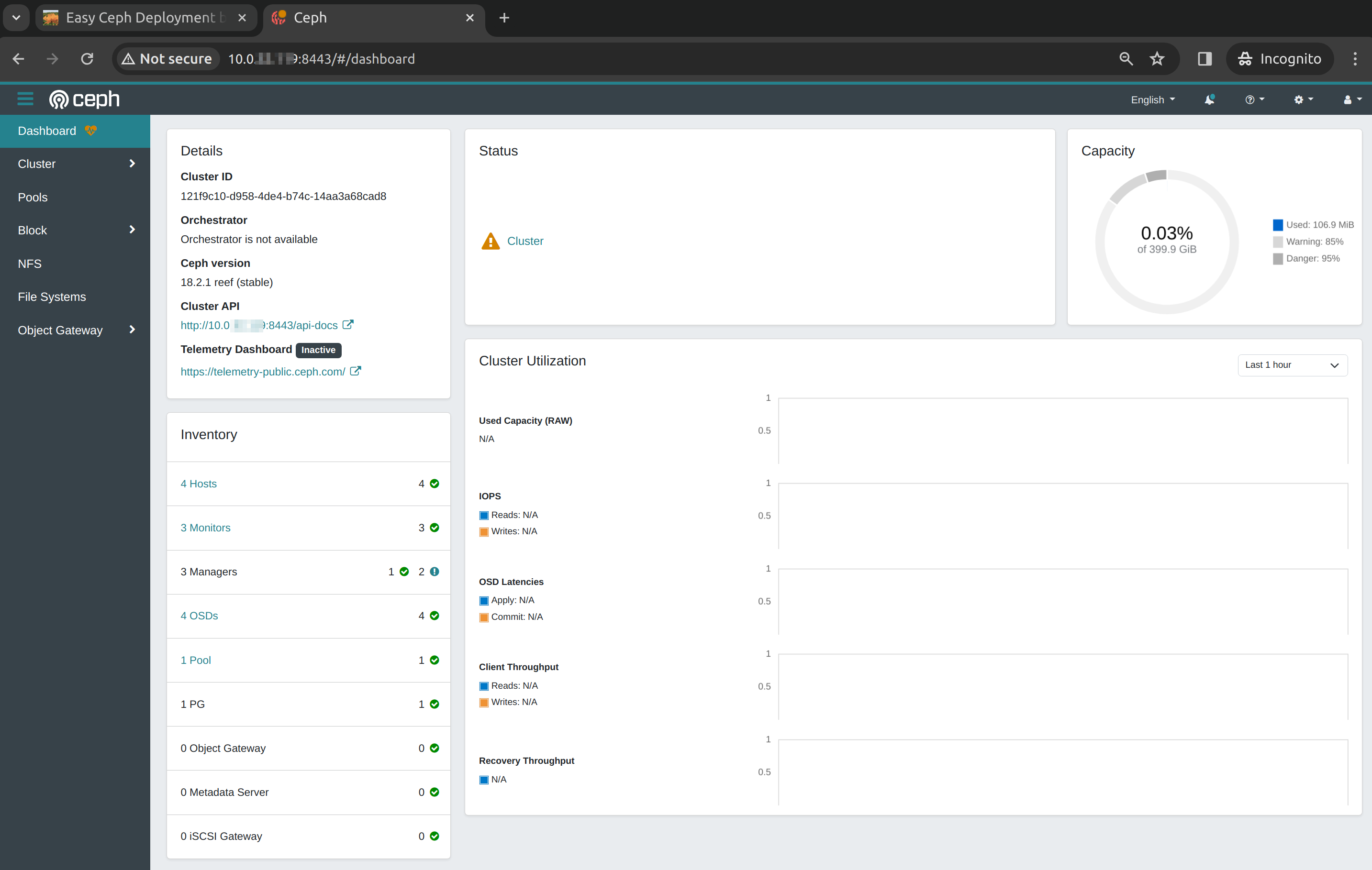Ceph - Easy Deployment by ceph-ansible
I used ceph-ansible to deploy several Ceph 15 (octopus) and Ceph 17 (quincy) environments on Ubuntu 22.04 and Rocky 8 in the past, which worked well after some code changes. Recently I successfully deployed a Ceph 18 (reef) environment on Ubuntu 22.04 using ceph-ansible (again!). Overall it worked pretty well. I am sharing my steps in this article.
Let’s assume the Ubuntu 22.04 hosts have been installed. The following steps can be performed on any server which can reach ALL the Ubuntu hosts.
Step 1: Upgrade ansible
The ansible needs to be installed or upgraded to more recent version.
$ pip3 install --upgrade ansible ansible-core
$ pip3 list |grep ansible
ansible 9.3.0
ansible-base 2.10.17
ansible-core 2.16.4
If Ansible is not upgraded, an error might be displayed: Ansible version must be either 2.15 or 2.16!
Step 2: Clone ceph-ansible repository
$ git clone https://github.com/ceph/ceph-ansible.git
$ cd ceph-ansible
$ git checkout stable-8.0 # This branch is used to deploy ceph 18 (reef)
Step 3: Create configuration files
I created two files for ceph installation
ceph-hostsdefines the inventory for ansible
[mons]
ceph-1 ansible_host=10.0.33.11
ceph-2 ansible_host=10.0.33.12
ceph-3 ansible_host=10.0.33.13
[mgrs]
ceph-1
ceph-2
ceph-3
[osds]
ceph-1
ceph-2
ceph-3
[monitoring]
ceph-1
ceph-2
ceph-3
[clients]
ceph-1
group_vars/all.ymldefines some environment variables
You need to change some values for your use, for example ansible_user, ansible_ssh_pass, public_network, cluster_network.
ansible_user: root
ansible_ssh_pass: password
no_log: false
cluster: ceph
configure_firewall: False
ceph_origin: repository
ceph_repository: community
ceph_stable_release: reef
ceph_mirror: http://eu.ceph.com
ceph_stable_key: http://eu.ceph.com/keys/release.asc
ceph_stable_repo: "{{ ceph_mirror }}/debian-{{ ceph_stable_release }}"
ceph_stable_distro_source: jammy
public_network: "10.0.32.0/20"
cluster_network: "10.0.32.0/20"
monitor_interface: eth0
ip_version: ipv4
ceph_conf_key_directory: /etc/ceph
# Permissions for keyring files in /etc/ceph
ceph_keyring_permissions: '0600'
cephx: true
devices:
- '/dev/sdb'
ceph_conf_overrides:
mon:
mon_allow_pool_delete: true
dashboard_enabled: True
dashboard_protocol: http
dashboard_port: 8443
dashboard_admin_user: admin
dashboard_admin_password: password
grafana_admin_user: admin
grafana_admin_password: admin
grafana_uid: 472
grafana_datasource: Dashboard
grafana_dashboard_version: reef
grafana_port: 3000
grafana_allow_embedding: TrueStep 4: (Optional) Update hosts
I have faced some issues in the past, therefore I wrote small playbooks to fix them
update_authorized_keys.yaml: copy local public key to Ubuntu hostsupdate_hostname.yaml: update hostname of Ubuntu hosts to the inventory hostnameupdate_resolv_conf.yaml: update name servers in /etc/resolv.conf in Ubuntu hostsremove-unattended-upgrades.yaml: kill apt processes and remove unattended-upgrades
The content of files are appended to the end of this article.
$ cat > update_node.yaml <<EOF
---
- import_playbook: update_authorized_keys.yaml
- import_playbook: update_hostname.yaml
- import_playbook: update_resolv_conf.yaml
- import_playbook: remove-unattended-upgrades.yaml
EOF
$ ansible-playbook update_node.yaml -i ceph-hosts
Step 5: Install Ceph
$ ansible-galaxy install -r requirements.yml # Install requirements
$ cp ./site.yml.sample site.yml
$ ansible-playbook site.yml -i ceph-hosts --extra-vars "yes_i_know=true"
yes_i_know=true is used to ignore the warning below
TASK [Warn about ceph-ansible current status] ****************************************
fatal: [localhost]: FAILED! => changed=false
msg: cephadm is the new official installer. Please, consider migrating. See https://docs.ceph.com/en/latest/cephadm/install for new deployments or https://docs.ceph.com/en/latest/cephadm/adoption for migrating existing deployments.
If everything goes well, the end of output will be similar as below
PLAY RECAP ******************************************************************************************************************************************************************
localhost : ok=0 changed=0 unreachable=0 failed=0 skipped=1 rescued=0 ignored=0
ceph-1 : ok=434 changed=74 unreachable=0 failed=0 skipped=526 rescued=0 ignored=0
ceph-2 : ok=303 changed=60 unreachable=0 failed=0 skipped=396 rescued=0 ignored=0
ceph-3 : ok=312 changed=63 unreachable=0 failed=0 skipped=393 rescued=0 ignored=0
INSTALLER STATUS ************************************************************************************************************************************************************
Install Ceph Monitor : Complete (0:01:17)
Install Ceph Manager : Complete (0:00:57)
Install Ceph OSD : Complete (0:01:58)
Install Ceph Client : Complete (0:00:22)
Install Ceph Dashboard : Complete (0:00:33)
Install Ceph Grafana : Complete (0:01:22)
Install Ceph Node Exporter : Complete (0:02:15)
Install Ceph Crash : Complete (0:00:14)
Step 6: (Optional) Add a new OSD
To add a new OSD, for example ceph-4, update the ceph-hosts as below
[osds]
ceph-1
ceph-2
ceph-3
ceph-4 ansible_host=10.0.33.14
A small modification is required
diff --git a/site.yml.sample b/site.yml.sample
index e5bd9de61..9350cc449 100644
--- a/site.yml.sample
+++ b/site.yml.sample
@@ -57,7 +57,7 @@
- '!ohai'
delegate_to: "{{ item }}"
delegate_facts: True
- with_items: "{{ groups['all'] | difference(groups.get('clients', [])) }}"
+ with_items: "{{ groups['all'] }}"
run_once: true
when: delegate_facts_host | boolThen run the commands below
$ cp ./site.yml.sample site.yml
$ ansible-playbook site.yml -i ceph-hosts --limit ceph-4
...
PLAY RECAP ******************************************************************************************************************************************************************
ceph-4 : ok=180 changed=28 unreachable=0 failed=0 skipped=285 rescued=0 ignored=0
INSTALLER STATUS ************************************************************************************************************************************************************
Install Ceph OSD : Complete (0:01:01)
Install Ceph Node Exporter : Complete (0:01:01)
Install Ceph Crash : Complete (0:00:07)
Please refer to Adding osd(s)
Step 7: Ceph Dashboard
Open the URL http://ceph-1:8443 in browser, login with the username/password in group_vars/all.yml, the ceph dashboard is shown.

Ansible playbooks
1. update_authorized_keys.yaml
---
- hosts: all
tasks:
- name: copy public key to remote server
copy:
src: ~/.ssh/id_rsa.pub
dest: /root/.ssh/authorized_keys2. update_hostname.yaml
---
- hosts: all
gather_facts: no
tasks:
- setup:
- name: Set a hostname specifying strategy
hostname:
name: "{{ inventory_hostname }}"
use: "systemd"
when: ansible_facts.hostname != inventory_hostname
- setup:
- name: verify hostname
ansible.builtin.assert:
that:
- ansible_facts.hostname == inventory_hostname
fail_msg: "ansible_facts.hostname is not same as inventory_hostname"
success_msg: "ansible_facts.hostname is same as inventory_hostname"3. update_resolv_conf.yaml
---
- hosts: all
tasks:
- name: Overwrite /etc/resolv.conf
# /etc/resolv.conf -> ../run/systemd/resolve/stub-resolv.conf
copy:
dest: /etc/resolv.conf
force: yes
content: |
nameserver 8.8.8.8
nameserver 1.1.1.14. remove-unattended-upgrades.yaml
---
- hosts: all
tasks:
- name: Make sure /var/lib/dpkg/lock-frontend is not in use
shell: "lsof -t /var/lib/dpkg/lock-frontend | kill -9 || true"
ignore_errors: yes
- name: Remove package unattended-upgrades
apt:
pkg: "{{ item }}"
state: absent
force: true
with_items:
- unattended-upgrades
ignore_errors: yes
- name: Make sure unattended-upgrades is completely purged
shell: "dpkg --purge unattended-upgrades || true"
ignore_errors: yes